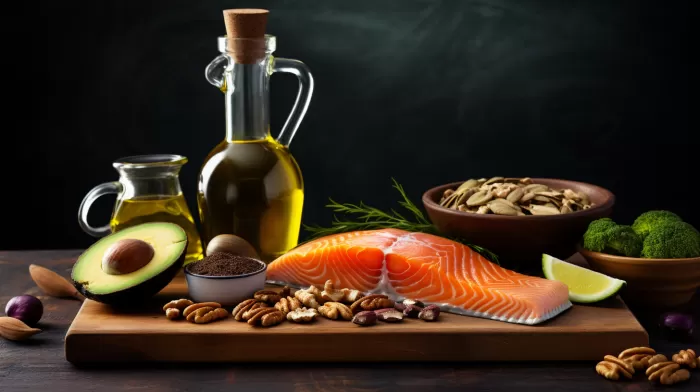It’s time to set the record straight about fats. It is a common misconception that consuming fats leads to obesity and related health conditions. The truth is that fats are essential for numerous aspects of our health, and the key is choosing the right kind of fats to include in our diet. This article aims to shed light on distinguishing between various types of fats and incorporating healthy fats into our daily lives.
Monounsaturated Fats (MUFAs)
Monounsaturated fats are liquid at room temperature and can be found in several common oils like flax, sesame, olive, and sunflower oils, along with saturated and polyunsaturated fats. MUFAs have been associated with numerous health benefits, such as supporting healthy cholesterol levels, balancing insulin, and controlling blood glucose. Some sources of MUFAs include nuts, seeds, and avocados.
Polyunsaturated Fats (PUFAs)
Polyunsaturated fats are mainly found in vegetable, grain, and some fish oils. They offer similar health benefits as MUFAs since they contain essential fatty acids like omega-3 and omega-6. These essential fatty acids are crucial for our overall health since the body cannot produce them on its own, making it necessary to acquire them from foods like flax, chia, and fish oil.
However, the key is to maintain a balanced ratio of omega-3 and omega-6 intake. A poor ratio might lead to chronic inflammation, free radical damage, and oxidative stress. Additionally, incorporating more omega-3 fats through supplementation can help balance this ratio. Some experts even recommend a 1:1 ratio for the best health results.
Saturated Fats
Contrary to popular belief, consuming moderate amounts of saturated fats can support various aspects of health, including cellular integrity, cardiovascular health, immunity, and vital energy. Saturated fats are mainly found in butter, animal fats, coconut oil, and tropical oils. When comparatively more solid at room temperature, saturated fats make for better cooking oils since they remain stable at high temperatures, making them less likely to become rancid during the cooking process. It is crucial to avoid rancid fats, as their molecular structures can cause cellular and tissue damage.
The Dangers of Trans Fats
Trans fats are the worst kind of fats and should be avoided completely. Found in many processed foods, these industrial fats undergo a chemical process to extend the shelf life of food products. Trans fats are associated with inflammation, cellular dysfunction, and many critical functions. On top of that, our bodies struggle to process and eliminate them, leading to weight gain, unhealthy cholesterol levels, arterial plaque, diabetes, heart disease, and immune dysfunction.
Incorporating Healthy Fats
To make the most of healthy fat benefits, aim to obtain around 25% of your daily caloric intake from healthy fats. Some ways to incorporate healthy fats into your diet include using raw olive or flax oil as salad dressings, adding chia seeds or avocado to your morning smoothie, snacking on raw walnuts throughout the day, and eating more fish like salmon. You can also look for supplements containing balanced ratios of essential fatty acids.
Managing Cholesterol Levels
By consuming healthy fats in moderation, one can reduce elevated LDL cholesterol, improve HDL cholesterol, and enhance cardiovascular markers. Certain healthy fats like coconut oil can contribute to burning fat and achieving a balanced weight. Additionally, healthy fats can help reduce inflammation and oxidative stress, which are crucial in promoting heart health and protecting us against cardiovascular disease.
In conclusion, incorporating the right types of fats into your diet is essential for your overall well-being. Healthy fats have been used therapeutically for centuries, playing a crucial role in physical, mental, and emotional health. Remember to consume these fats in moderation and pay attention to the sources to fully unlock the benefits of a balanced diet.



